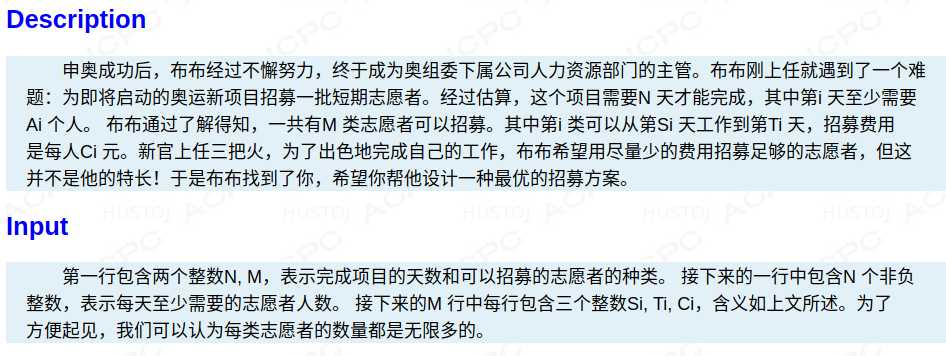标签:观察 def 进一步 流量 img ring https ref com
http://www.lydsy.com/JudgeOnline/problem.php?id=1061
题意:

思路:
直接放上大神的建模过程!!!(https://www.byvoid.com/zhs/blog/noi-2008-employee)
这道题正确的解法是构造网络,求网络最小费用最大流,但是模型隐藏得较深,不易想到。构造网络是该题的关键,以下面一个例子说明构图的方法和解释。
例如一共需要4天,四天需要的人数依次是4,2,5,3。有5类志愿者,如下表所示:
种类 1 2 3 4 5 时间 1-2 1-1 2-3 3-3 3-4 费用 3 4 3 5 6 设雇佣第i类志愿者的人数为X[i],每个志愿者的费用为V[i],第j天雇佣的人数为P[j],则每天的雇佣人数应满足一个不等式,如上表所述,可以列出
P[1] = X[1] + X[2] >= 4
P[2] = X[1] + X[3] >= 2
P[3] = X[3] + X[4] +X[5] >= 5
P[4] = X[5] >= 3
对于第i个不等式,添加辅助变量Y[i] (Y[i]>=0) ,可以使其变为等式
P[1] = X[1] + X[2] - Y[1] = 4
P[2] = X[1] + X[3] - Y[2] = 2
P[3] = X[3] + X[4] +X[5] - Y[3] = 5
P[4] = X[5] - Y[4] = 3
在上述四个等式上下添加P[0]=0,P[5]=0,每次用下边的式子减去上边的式子,得出
① P[1] - P[0] = X[1] + X[2] - Y[1] = 4
② P[2] - P[1] = X[3] - X[2] -Y[2] +Y[1] = -2
③ P[3] - P[2] = X[4] + X[5] - X[1] - Y[3] + Y[2] =3
④ P[4] - P[3] = - X[3] - X[4] + Y[3] - Y[4] = -2
⑤ P[5] - P[4] = - X[5] + Y[4] = -3
观察发现,每个变量都在两个式子中出现了,而且一次为正,一次为负。所有等式右边和为0。接下来,根据上面五个等式构图。
- 每个等式为图中一个顶点,添加源点S和汇点T。
- 如果一个等式右边为非负整数c,从源点S向该等式对应的顶点连接一条容量为c,权值为0的有向边;如果一个等式右边为负整数c,从该等式对应的顶点向汇点T连接一条容量为c,权值为0的有向边。
- 如果一个变量X[i]在第j个等式中出现为X[i],在第k个等式中出现为-X[i],从顶点j向顶点k连接一条容量为∞,权值为V[i]的有向边。
- 如果一个变量Y[i]在第j个等式中出现为Y[i],在第k个等式中出现为-Y[i],从顶点j向顶点k连接一条容量为∞,权值为0的有向边。
构图以后,求从源点S到汇点T的最小费用最大流,费用值就是结果。
根据上面的例子可以构造出如下网络,红色的边为每个变量X代表的边,蓝色的边为每个变量Y代表的边,边的容量和权值标已经标出(蓝色没有标记,因为都是容量∞,权值0)。
在这个图中求最小费用最大流,流量网络如下图,每个红色边的流量就是对应的变量X的值。
所以,答案为43+23+3*6=36。
上面的方法很神奇得求出了结果,思考为什么这样构图。我们将最后的五个等式进一步变形,得出以下结果
① - X[1] - X[2] + Y[1] + 4 = 0
② - X[3] + X[2] + Y[2] - Y[1] - 2 = 0
③ - X[4] - X[5] + X[1] + Y[3] - Y[2] + 3 = 0
④ X[3] + X[4] - Y[3] + Y[4] - 2 = 0
⑤ X[5] - Y[4] - 3 = 0
可以发现,每个等式左边都是几个变量和一个常数相加减,右边都为0,恰好就像网络流中除了源点和汇点的顶点都满足流量平衡。每个正的变量相当于流入该顶点的流量,负的变量相当于流出该顶点的流量,而正常数可以看作来自附加源点的流量,负的常数是流向附加汇点的流量。因此可以据此构造网络,求出从附加源到附加汇的网络最大流,即可满足所有等式。而我们还要求
最小,所以要在X变量相对应的边上加上权值,然后求最小费用最大流。
1 #include<iostream> 2 #include<algorithm> 3 #include<cstring> 4 #include<cstdio> 5 #include<vector> 6 #include<stack> 7 #include<queue> 8 #include<cmath> 9 #include<map> 10 #include<set> 11 using namespace std; 12 typedef long long ll; 13 typedef pair<int,int> pll; 14 const int INF = 0x3f3f3f3f; 15 const int maxn = 1000 + 5; 16 17 int n,m; 18 19 struct Edge 20 { 21 int from, to, cap, flow, cost; 22 Edge(int u, int v, int c, int f, int w) :from(u), to(v), cap(c), flow(f), cost(w) {} 23 }; 24 25 struct MCMF 26 { 27 int n, m; 28 vector<Edge> edges; 29 vector<int> G[maxn]; 30 int inq[maxn]; 31 int d[maxn]; 32 int p[maxn]; 33 int a[maxn]; 34 35 void init(int n) 36 { 37 this->n = n; 38 for (int i = 0; i<n; i++) G[i].clear(); 39 edges.clear(); 40 } 41 42 void AddEdge(int from, int to, int cap, int cost) 43 { 44 edges.push_back(Edge(from, to, cap, 0, cost)); 45 edges.push_back(Edge(to, from, 0, 0, -cost)); 46 m = edges.size(); 47 G[from].push_back(m - 2); 48 G[to].push_back(m - 1); 49 } 50 51 bool BellmanFord(int s, int t, int &flow, int & cost) 52 { 53 for (int i = 0; i<n; i++) d[i] = INF; 54 memset(inq, 0, sizeof(inq)); 55 d[s] = 0; inq[s] = 1; p[s] = 0; a[s] = INF; 56 57 queue<int> Q; 58 Q.push(s); 59 while (!Q.empty()){ 60 int u = Q.front(); Q.pop(); 61 inq[u] = 0; 62 for (int i = 0; i<G[u].size(); i++){ 63 Edge& e = edges[G[u][i]]; 64 if (e.cap>e.flow && d[e.to]>d[u] + e.cost){ 65 d[e.to] = d[u] + e.cost; 66 p[e.to] = G[u][i]; 67 a[e.to] = min(a[u], e.cap - e.flow); 68 if (!inq[e.to]) { Q.push(e.to); inq[e.to] = 1; } 69 } 70 } 71 } 72 73 if (d[t] == INF) return false; 74 flow += a[t]; 75 cost += d[t] * a[t]; 76 for (int u = t; u != s; u = edges[p[u]].from) 77 { 78 edges[p[u]].flow += a[t]; 79 edges[p[u] ^ 1].flow -= a[t]; 80 } 81 return true; 82 } 83 84 int MincostMaxdflow(int s, int t){ 85 int flow = 0, cost = 0; 86 while (BellmanFord(s, t, flow, cost)); 87 return cost; 88 } 89 }t; 90 91 int a[maxn]; 92 93 int main() 94 { 95 //freopen("in.txt","r",stdin); 96 scanf("%d%d",&n,&m); 97 int src = 0, dst = n+2; 98 t.init(dst+1); 99 for(int i=1;i<=n;i++) scanf("%d",&a[i]); 100 a[0] = a[n+1] = 0; 101 for(int i=1;i<=n+1;i++) 102 { 103 int tmp = a[i] - a[i-1]; 104 if(tmp>0) t.AddEdge(src,i,tmp,0); 105 else t.AddEdge(i,dst,-tmp,0); 106 } 107 for(int i=1;i<=n;i++) t.AddEdge(i+1,i,INF,0); 108 for(int i=1;i<=m;i++) 109 { 110 int x,y,z; 111 scanf("%d%d%d",&x,&y,&z); 112 t.AddEdge(x,y+1,INF,z); 113 } 114 printf("%d\n",t.MincostMaxdflow(src,dst)); 115 return 0; 116 }
BZOJ 1061: [Noi2008]志愿者招募(线性规划与网络流)
标签:观察 def 进一步 流量 img ring https ref com
原文地址:http://www.cnblogs.com/zyb993963526/p/7871956.html